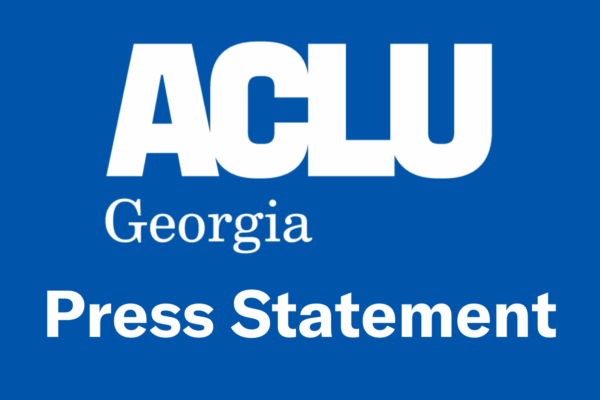ATLANTA – The ACLU of Georgia opposes Senate Bill 200, a bill with extreme, dangerous, and unnecessary government restrictions on religion.
“Under Senate Bill 200, religious institutions of all types would have an absolute right to operate during an emergency without following any safety precautions and procedures. The right to exercise one’s faith is among our most fundamental constitutional rights. But it is constitutionally appropriate for the government to place restrictions on religious activities and religious institutions,” said Andrea Young, executive director of the ACLU of Georgia. “However, Senate Bill 200 is extreme, dangerous, and unnecessary, and we urge all Senators to vote no on this measure.”
Senate Bill 200 is on the Senate Rules Calendar for a vote in the Senate today.
Background:
- Exempting worship services from neutral and generally applicable restrictions enacted during public emergencies would harm others and is the type of religious preference that the Constitution forbids. Religious freedom is not a license to endanger other people and the public.[i]
- SB 200 is much more extreme than the Supreme Court’s recent rulings, which have affirmed the First Amendment’s protections for religious worship.
- While the Supreme Court has struck down sweeping bans on indoor worship services in states or areas where other risky gatherings of people have been allowed, the Court also made clear in a recent ruling that states may properly impose some restrictions on worship services.
- In a recent ruling, the Supreme Court allowed California to prohibit singing and chanting during indoor worship services and cap attendance at indoor worship services to 25% of a church’s occupancy limit in areas of the state hardest hit by COVID-19.[ii]
- SB 200 gives free rein to all religious institutions to continue operating however they might desire, with no safety precautions and no matter the danger. The Supreme Court’s narrow rulings have only addressed worship services conducted with safety protocols in place. The Court’s rulings did not give all religious organizations blanket permission to continue their operations unabated.
- SB 200 covers a wide array of public emergencies, but the Supreme Court has only ruled on pandemic-related restrictions. The Court, for example, has never suggested that a church could continue holding worship services despite an approaching hurricane and evacuation order. Every emergency will be different and requires that both the courts and state officials have flexibility to address them.
Media contact: [email protected]
[i] See, e.g., Lee v. Weisman, 505 U.S. 577, 587 (1992) (“The principle that government may accommodate the free exercise of religion does not supersede the fundamental limitations imposed by the Establishment Clause.”); Estate of Thornton v. Caldor, Inc., 472 U.S. 703, 709 (1985) (striking down a statute that gave Sabbath observers an unqualified right not to work on their Sabbath because “the statute takes no account of the convenience or interests of the employer or those of other employees who do not observe a Sabbath”); see also, e.g., Cutter v. Wilkinson, 544 U.S. 709, 720 (2005) (noting that in analyzing religious exemptions, “courts must take adequate account of the burdens a requested accommodation may impose on nonbeneficiaries”); Texas Monthly, Inc. v. Bullock, 489 U.S. 1, 18 n.8 (1989) (invalidating sales-tax exemption for religious periodicals in part because exemption would have “burden[ed] nonbeneficiaries by increasing their tax bills”); United States v. Lee, 455 U.S. 252, 261 (1982) (rejecting employer’s requested religious exemption from paying social-security taxes because exemption would have “operate[d] to impose the employer’s religious faith on the employees”); Burwell v. Hobby Lobby, 573 U.S. 682, 739 (2014) (Kennedy, J., concurring) (explaining that religious exercise cannot “unduly restrict other persons . . . in protecting their own interests”); id. at 745 (Ginsburg, J., joined by Breyer, Kagan, and Sotomayor, J., dissenting) (“Accommodations to religious beliefs or observances . . . must not significantly impinge on the interests of third parties.”).In recognizing permissible religious exemptions, the Supreme Court has gone out of its way to note that the exemptions would not harm others. See, e.g., Sherbert v. Verner, 374 U.S. 398, 409 (1963) (exempting claimant from state unemployment benefits policy but noting that “the recognition of the appellant’s right to unemployment benefits under the state statute [does not] serve to abridge any other person’s religious liberties.”); W.V. State Bd. of Educ. v. Barnette, 319 U.S. 624, 630 (1943) (excusing students from reciting Pledge of Allegiance, but noting that “the refusal of these persons to participate in the ceremony does not interfere with or deny rights of others to do so”); cf. Prince v. Massachusetts, 321 U.S. 158, 166–67 (1944) (“The right to practice religion freely does not include liberty to expose the community or the child to communicable disease or the latter to ill health or death.”).
[ii] South Bay United Pentecostal Church v. Newsom, No. 20A136, 2021 WL 406258 (Feb. 5, 2021).
Stay Informed
Sign up to be the first to hear about how to take action.
By completing this form, I agree to receive occasional emails per the terms of the ACLU’s privacy statement.
By completing this form, I agree to receive occasional emails per the terms of the ACLU’s privacy statement.

